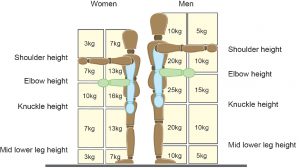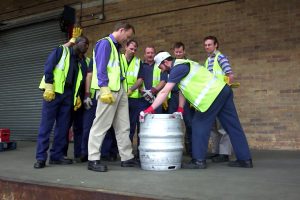(We also have a People Moving & Handling FAQ section.)
Manual Handling Frequently Asked Questions
and answers!
What is Manual Handling?
Manual Handling relates to the moving of items either by lifting, lowering, carrying, pushing or pulling. We’ve got a specific page dedicated to this question: What is Manual Handling?
What is People Moving & Handling?
People Moving & Handling is used to refer to the Manual Handling of people (or animals).
We’ve got a specific page dedicated to this question: What is People Moving & Handling? or visit our People Moving & Handling FAQ page.
What is the law on manual handling to protect employees?
Employers have a legal obligation to make a sufficient and suitable assessment of the risk to employees from the manual handling of loads. Read more about this on these pages of our site:
What can be done to help prevent manual handling injuries?
This is a big one! In simple terms, the main thing is a risk assessment, though there are other considerations: Firstly, does the load need to be moved at all? If so, can it be moved mechanically by using a handling aid, such as a pallet truck, an electric or hand-powered hoist, or a conveyor?
If manual lifting is the only option then there are a number of things that can be done to reduce the risk, including changes to the load, the environment and of course, effective and regular training for the person performing the manual handling task!
Are there any recommended weight limits for manual lifting?

Basic guideline lifting weight limits for men and women.
The law does not identify a maximum weight limit, it places duties on employers to manage or control risk. Things to be considered will include the individual carrying out the handling operation, the weight to be lifted, the distance to be carried, the nature of the load or the postures to be adopted or the availability of equipment to facilitate the lift.
There is no universally safe maximum weight for any load, however, there are varying degrees of risk. The Manual Handling Operations Regulations give basic guideline figures for lifting and lowering which indicate when a more detailed risk assessment should be carried out.
Is there such a thing as a 'no lifting' policy?
The Manual Handling Operations Regulations 1992 do not prohibit individual types of manual handling or endorse ‘no lifting’ policies. However, manual handling should be limited to those times when it cannot be avoided and only where the risk has been assessed and minimised. Employers cannot simply pass on the risk to employees and a balanced approach to risk is advocated.
What is the correct lifting technique?
There is no single correct way to lift. The preferred technique for lifting will depend on many things, such as the weight and size of the item. For example, it would be easier to pick up something that is a box-shape with handholds than something awkwardly shaped or where the weight is distributed unevenly.
The content of any training in good handling technique should be tailored to the particular situation or individual circumstances under which the manual handling takes place.
What are The Manual Handling Operations Regulations 1992 and how do they affect me?
The Manual Handling Operations Regulations is a piece of Health & Safety legislation that affects both employers and employees. It passed in to law in 1992. We’ve got a specific page dedicated to this question: What are The Manual Handling Operations Regulations 1992?
How long are Manual Handling courses certified for? How often do I need refresher training?
Our standard certification period is 3 years, after which a course of refresher training would then be required. The refresher training would certify you for a further 3 year period. This certification period is considered the standard minimum requirement and the period should be determined by individual organisations and based on their risk assessments and policies. We have a more detailed page dedicated to this question: How long are Manual Handling courses certified for?
Can I do a refresher course with OFI, even if I have been trained by another provider?
We would generally be happy to accept individuals on one of our refresher courses if they have been trained by a reputable manual handling training organisation. This means that you would likely have completed a four day (or similar) initial training course, and if appropriate, one or more refresher courses of not less than two days duration. The content of these courses should be generally similar to the training provided by Osteopaths For Industry, in that it includes practical skills, theory, teaching skills and risk assessment.
If you are unsure as to whether your training history meets this criteria, then simply contact us – we’re here to help!
How often are OFI training materials reviewed and updated?
All of our course materials are reviewed regularly and updated as necessary to reflect current working practices and relevant regulations. In addition, we strive to present our training material in a clear and engaging format, so as to best communicate the message to course delegates. Our trainers regularly attend formal training workshops and seminars as part of their continuing professional development programme.
What is a public course? How does it differ from an in-house or on-site course?
A public course is open to delegates from any company or organisation. We schedule these courses on set dates throughout the year, and they are run for a maximum of 12 delegates, and are typically held in a conference room in cities such as London, Manchester or Birmingham. A public course is an ideal way of keeping costs down if you only have 1, 2 or 3 delegates to train – essentially the training costs are split between all the delegates (companies) in attendance, allowing us to provide a cheaper training cost to individuals.
An in-house course would be run specifically for your company or organisation, on dates of your choosing. It would normally take place at your place of work. If you have 3 or more delegates to train, then it becomes more cost effective to run an in-house course rather than booking individuals on to a public course.
Is there an advantage of training on an in-house course?

OFI Manual Handling Instructor teaching lifting skills on site, during an in-house course.
An in-house course (one that is conducted at your own work site) allows your delegates to train in a familiar environment, using the actual equipment and resources that they would normally use day in, day out. This allows the practical training to be completely focused on the tasks that your delegates actually perform.
In addition, you can schedule an in-house course for any date/time that suits you (subject to the availability of our trainers).
What makes OFI courses unique compared to other training providers?
We pride ourselves in having some of the very best, highly qualified and most experienced trainers in the business. Our unique selling point is that ALL of our trainers are qualified (and experienced) Osteopaths or Physiotherapists. This provides them with an intricate understanding of the human body and its musculoskeletal systems. Read more about OFI here.
Can OFI courses be customised to suit our requirements?
Yes, our in-house courses can be tailored to meet your exact requirements. At the very least we can set up a telephone call between our trainer and your training organiser so that we can discuss your specific training requirements, and any issues or specific areas that you would like to concentrate on. This bespoke approach can be followed further (depending on your budget) to include pre-course assessments, consultancy, bespoke training materials, and customised video or online training & support products.
Will I have an opportunity to provide feedback after a training course?
Yes, we take feedback very seriously and are committed to continuous improvement. All the delegates on our courses are asked to complete a course feedback questionnaire which we use to review the course for course content, teaching style, the quality of the materials and venue suitability. In addition, we would welcome any feedback either directly to the trainer, or to our head office after the course has finished.
What after-course support does OFI provide?
You will have priority access to our specialist trainers for advice on any Manual Handling issues that may arise following your training course. Help and advice is free of charge, providing you are still within the course certification period. We aim to ensure that queries are answered within 24 hours. Queries are submitted by email initially and one of our experts will call back to discuss the issue and help to resolve the problem.
Your organisation will also have access to our free online training tutorials and educational videos, featuring our expert trainers and qualified Osteopaths. The videos cover topics such as Spinal Anatomy, Cumulative Strain and generalist Lifting & Handling best-practice advice and tutorials.
Manual Handling Case Study
Case study of a large banking group in the City of London.
Manual Handling Certification - Your questions answered
Manual Handling Certification – Your questions answered.



